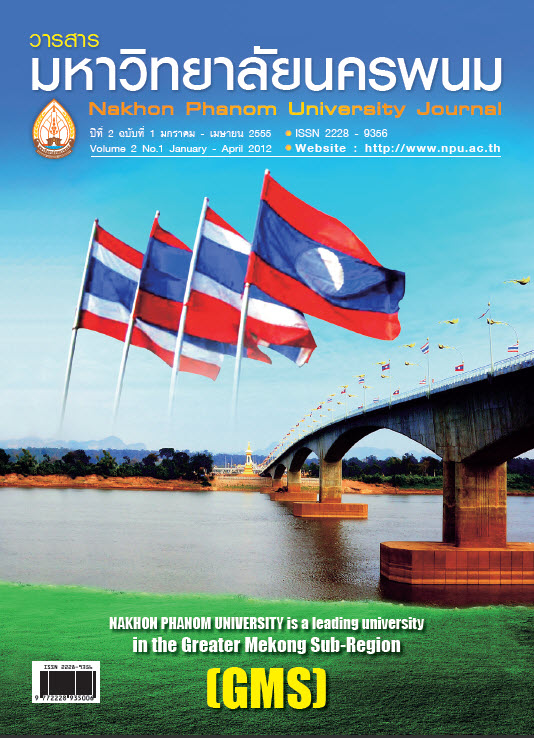การเปรียบเทียบผลสัมฤทธิ์ทางเรียน ทักษะกระบวนการทางวิทยาศาสตร์ขั้นพื้นฐานและเจตคติเชิงวิทยาศาสตร์ระหว่างการจัดการเรียนรู้แบบลัดดาและแบบวัฏจักรการเรียนรู้ 7 ขั้น ชั้นประถมศึกษาปีที่ 6
Main Article Content
Abstract
การจัดกิจกรรมการเรียนการสอนกลุ่มสาระการเรียนรู้วิทยาศาสตร์ ที่ยังมีข้อบกพร่องด้านการเสริมสร้างให้นักเรียนเกิด การเรียนรู้รอบด้านให้ประสบความสำเร็จได้นั้น ขึ้นอยู่กับองค์ประกอบสำคัญ โดยเฉพาะอย่างยิ่งรูปแบบการสอน ที่ส่งผลต่อผลสัมฤทธิ์ ทางการเรียนทักษะกระบวนการทางวิทยาศาสตร์ และเจตคติเชิงวิทยาศาสตร์ ในการวิจัยครั้งนี้มีวัตถุประสงค์เพื่อ 1) ศึกษาผลสัมฤทธิ์ทางการเรียน ทักษะกระบวนการทางวิทยาศาสตร์ขั้นพื้นฐาน เจตคติเชิงวิทยาศาสตร์ของนักเรียนชั้นประถมศึกษาปีที่ 6 ที่จัดกิจกรรมการเรียนรู้ แบบลัดดา กับแบบวัฏจักรการเรียนรู้ 7 ขั้น ก่อนเรียนและหลังเรียน 2) เปรียบเทียบผลสัมฤทธิ์ทางการเรียน ทักษะกระบวนการทางวิทยาศาสตร์ขั้นพื้นฐาน เจตคติเชิงวิทยาศาสตร์ของนักเรียนชั้นประถมศึกษาปีที่ 6 ที่จัดกิจกรรมการเรียนรู้แบบลัดดากับแบบวัฏจักรการเรียนรู้ 7 ขั้นระหว่างก่อนเรียนและหลังเรียน 3) เปรียบเทียบผลสัมฤทธิ์ทางการเรียน ทักษะกระบวนการทางวิทยาศาสตร์ขั้นพื้นฐาน เจตคติเชิงวิทยาศาสตร์ของนักเรียนชั้นประถมศึกษาปีที่ 6 ระหว่างการจัดการเรียนรู้แบบลัดดา กับแบบวัฏจักรการเรียนรู้ 7 ขั้น ประชากรที่ใช้ในการวิจัยได้แก่ นักเรียนชั้นประถมศึกษาปีที่ 6 ปีการศึกษา 2553 ในกลุ่มเครือข่ายนาขมิ้นโพนบกนาในอำเภอโพนสวรรค์ จังหวัดนครพนม กลุ่มตัวอย่างคือนักเรียนที่กำลังเรียนอยู่ชั้นประถมศึกษาปีที่ 6 ภาคเรียนที่ 2 ปีการศึกษา 2553โรงเรียนบ้านขามเตี้ยใหญ่ ตำบลนาขมิ้น อำเภอโพนสวรรค์ จังหวัดนครพนมจำนวน 30 คน เป็นกลุ่มทดลองที่ 1 ได้รับประสบการณ์การเรียนรู้แบบลัดดา และนักเรียนชั้นประถมศึกษาปีที่ 6 โรงเรียนบ้านโพนบก จำนวน 30 คน เป็นกลุ่มทดลองที่ 2 ได้รับการจัดประสบการณ์การเรียนรู้แบบจัดการเรียนรู้แบบวัฏจักรการเรียนรู้ 7 ขั้น ซึ่งมาได้มาโดยวิธีการสุ่มแบบกลุ่ม เครื่องมือที่ใช้ในการวิจัย ได้แก่ แผนการจัดการเรียนรู้แบบวัฏจักรการเรียนรู้ 7 ขั้น และแผนการจัดการเรียนรู้แบบลัดดา กลุ่มสาระการเรียนรู้วิทยาศาสตร์ เรื่อง สิ่งมีชีวิตกับสิ่งแวดล้อม ชั้นประถมศึกษาปีที่ 6 จำนวนรูปแบบละ 8 แผนใช้เวลา 16 ชั่วโมง แบบทดสอบวัดผลสัมฤทธิ์ทางการเรียน ซึ่งมีค่าความเชื่อมั่นทั้งฉบับเท่ากับ 0.87 แบบทดสอบวัดทักษะกระบวนการทางวิทยาศาสตร์ขั้นพื้นฐาน ซึ่งค่าความเชื่อมั่นทั้งฉบับเท่ากับ 0.91 และแบบวัดเจตคติตเชิงวิทยาศาสตร์ซึ่งมีค่าความเชื่อมั่นทั้งฉบับเท่ากับ 0.89 เป็นแบบปรนัย 4 ตัวเลือก จำนวน 30 ข้อ ทั้ง 3 ชุด สถิติที่ใช้ในการวิเคราะห์ข้อมูลคือ ค่าเฉลี่ย ร้อยละ ส่วนเบี่ยงเบนมาตรฐาน และทดสอบสมมติฐานด้วยสถิติ t–test แบบ Dependent Samples และ HotellingT2
ผลการวิจัยปรากฏดังนี้ 1) นักเรียนที่เรียนด้วยการจัดการเรียนรู้แบบลัดดา มีคะแนนผลสัมฤทธิ์ทางการเรียน ร้อยละ 86.22 คะแนนทักษะกระบวนการทางวิทยาศาสตร์ ร้อยละ 88.44 และคะแนนเจตคติเชิงวิทยาศาสตร์ ร้อยละ 91.22 2) นักเรียนที่เรียนด้วยการจัดการเรียนรู้แบบวัฏจักรการเรียนรู้ 7 ขั้น มีคะแนนผลสัมฤทธิ์ทางการเรียน ร้อยละ 78.56 คะแนนทักษะ กระบวนการทางวิทยาศาสตร์ ร้อยละ 78.89 และคะแนนเจตคติเชิงวิทยาศาสตร์ ร้อยละ 81.56 3) นักเรียนที่เรียนด้วยการจัดการเรียนรู้แบบลัดดา และแบบวัฏจักรการเรียนรู้ 7 ขั้น มีคะแนนผลสัมฤทธิ์ทางการเรียน ทักษะกระบวนการทางวิทยาศาสตร์ขั้นพื้นฐาน และเจตคติเชิงวิทยาศาสตร์หลังเรียนสูงกว่า ก่อนเรียนอย่างมีนัยสำคัญทางสถิติที่ระดับ .01 นักเรียนที่เรียนด้วยการจัดการเรียนรู้แบบลัดดามีผลสัมฤทธิ์ทางการเรียน ทักษะกระบวนการทางวิทยาศาสตร์ขั้นพื้นฐาน และเจตคติเชิงวิทยาศาสตร์ หลังการจัดกิจกรรมการเรียนรู้สูงกว่า การจัดการเรียนรู้แบบวัฏจักรการเรียนรู้ 7 ขั้นอย่างมีนัยสำคัญทางสถิติที่ระดับ .01 ดังนั้นจึงสมควรสนับสนุนให้ครูที่สอนชั้นประถมศึกษาปีที่ 6 นำการจัดการเรียนรู้ทั้งสองแบบ ไปใช้ในการจัดการเรียนรู้เพื่อให้มีการพัฒนาผลสัมฤทธิ์ทางการเรียน ทักษะกระบวนการทางวิทยาศาสตร์ขั้นพื้นฐาน และเจตคติเชิงวิทยาศาสตร์
Scientific instructional management is defective in successful encouraging students’ cognitive knowledge. It depends on some important factors, especially instructional approaches which affected learning achievement, basic scientific process skills and scientific attitude. The purposes of this research were to 1) Investigate learning achievement, basic scientific process skills and scientific attitude of grade 6 students before and after they studied using LADDA learning management and 7-E learning cycle, 2) Compare learning achievement, basic scientific process skills and scientific attitude of grade 6 students between before and after they studied using LADDA learning management and 7-E learning cycle, and 3) Compare learning achievement, basic scientific process skills and scientific attitude of grade 6 students between students who were taught by LADDA learning management and those who were taught by 7-E learning cycle. The population of the study was grade 6 students studying in the class of 2010 in the Nakhaminphonboknanai network in Phonsawan district, Nakhon Phanom. The samples were 2 groups of Prathomsueksa 6 students studying in the the 2nd semester of academic year of 2010:30 grade 6 students from Baan Kham Tia Yai School using LADDA learning management (the first experimental group) and other 30 grade 6 students from Baan Pone Bok School using7-E learning cycle. They were collected by means of cluster random sampling technique. The research instruments were lesson plans of LADDA learning management and 7-E learning cycle in the topic of living things and environment for grade 6 students comprising 8 lesson plans/16 hours for each instructional approach, the learning achievement test with a discrimination of 0.87, the test of basic scientific process skills with a discrimination of .91, and the 30-item multiple-choice test scientific attitude with a discrimination of 0.89. Statistics used in data analysis were mean, percentage, S.D., t-test (dependent samples) and HotellingT2 The results of the research were as follows: 1) The students who were taught by LADDA learning management showed learning achievement of 86.22 Percentage, scientific process skills of 88.44 Percentage and scientific attitude of 91.22 Percentage, 2) The students who were taught by 7-E learning cycle revealed learning achievement of 78.56 Percentage, scientific process skills of 78.89 Percentage and scientific attitude of 81.56 Percentage, and 3) After studying with LADDA learning management and 7-E learningcycle, both groups of the students had higher scores of learning achievement, scientific process skills and scientific attitude with statistically significant level of .01. Besides, the students who were taught by LADDA learning management had learning achievement, scientific process skills and scientific attitude higher than those who learned using the 7-E learning cycle with statistically significant difference .01. In conclusion, the LADDA learning management and the 7-E learning cycle were options to stimulate students to reach higher scores of learning achievement, basic scientific process skills and scientific attitude. Thus, science teachers should implement these two approaches into their teaching in order to improve students’ learning achievement, basic scientific process skills and scientific attitude successfully.


